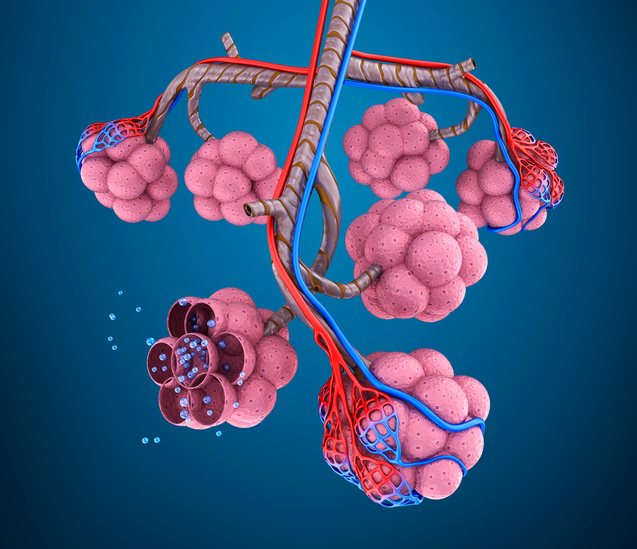- wikiskripta.eu - what is hyperventilation on Wikiskripta
- 93pristav.skauting.sk - what are emergencies in pdf
- fit.server.sk - article about tetany
- saintlukeskc.org - Understanding Hyperventilation Syndrome
- amjmed.com - Hyperventilation Syndrome: Why Is It Regularly Overlooked?
- emedicine.medscape.com - Hyperventilation Syndrome
What is hyperventilation? Shortness of breath, tingling in the face, hands, muscle spasms

Hyperventilation will torment the body and the soul. It will overwhelm a man in minutes if he doesn't get it right at the start. It will make the body stiffen, the limbs spasm, the muscles cramp. The shortness of breath and the pounding of the heart will make you fear for your life.
Article content
It can cause uncomfortable tingling of the lips, the whole face, hands or feet.
In worse cases, it can also cause muscle spasms. It is perceived as difficulty breathing and causes other general and unpleasant discomforts.
You ask:
What is hyperventilation of breathing?
What is the meaning of hyperventilation and what does it cause?
What is the connection between hyperventilation and tetany?
What is hyperventilation?
The term hyperventilation refers to a change in the frequency and depth of breathing.
Hyper means there is something above, that is, more than under normal conditions. Ventilation of the lungs is the exchange of air between the lungs and the outside environment.

Breathing is accelerated (tachypnea) and in addition deepened (hyperpnea) during hyperventilation.
In other words:
More air is taken into the lungs than the body's current demand.
As a consequence, changes in the blood occur at the biochemical level.
This condition can also be perceived as difficulty breathing. But one may not be aware of it at all.
Instead of labored breathing, very rapid and shallow breathing may be present. The breathing is of the thoracic type. The labored breathing is externally visible and, of course, audible.
Do you want to know more?
Read on with us.
It is not just a problem, but it can be solved.
Why bother further when there is a suitable solution.
If hyperventilation persists, there are biochemical changes in the blood that lead to other difficulties and problems. And these are hypocapnia and respiratory alkalosis. Hypocapnia is a decrease in the concentration of carbon dioxide (CO2) in the blood.
Respiratory alkalosis is actually an increase in the pH of the blood. It is caused by the excessive secretion ofCO2 from the blood during breathing - respiration. When the secretion of carbon dioxide from the blood increases, the concentration of carbonic acid decreases.
TIP: we provide information about the internal environment, maintaining homeostasis and pH stability in a magazine article.
The consequence of reduced bloodCO2 levels is a narrowing of the diameter of the arteries, i.e., the arterioles. This results in reduced blood supply and oxygenation of the tissues (hypoxia), both to the brain and the heart.
Consequently, the heart rate increases. In alkalosis, the level of ionized calcium decreases, resulting in increased neuromuscular excitability.
Respiration = breathing, from the Latin respiro, spiro meaning to breathe.
What are the causes of hyperventilation?
Hyperventilation is not a disease of the respiratory or cardiovascular system.
It is a malfunction of the autonomic nervous system. Breathing is a process that takes place on a reflex (automatic) level. But we can also influence it by will.
Hyperventilation can be acute and chronic. The acute is largely due to the psychological state of the person. In this case, it is very clear how the psyche influences the physical processes, and it works the other way round. If the body is not well, we feel it in the psyche.
The sudden onset of hyperventilation can cause other acute illnesses, such as heart attacks. Chronic hyperventilation is long term and can be caused by diseases of other body systems.

Causes of hyperventilation:
- Psychological condition
- nervous tension
- stress
- anxiety
- depression
- fear
- panic disorder and panic attack or phobia attack (claustrophobia in small spaces)
- hysteria
- neurotic disorders
- fatigue
- lack of sleep
- stroke
- cardiovascular disease
- heart attack
- heart failure
- lung disease
- asthma
- chronic obstructive pulmonary disease
- pneumonia
- pulmonary embolism
- liver disease
- kidney failure
- endocrine diseases
- anaemia
- acute pain
- metabolic acidosis (lowering of pH for a metabolic cause), as a compensatory mechanism
- high body temperature
- shock state
- intense bleeding
- loss of body fluids, dehydration
- sepsis
- stimulants such as caffeine, drugs, certain medications
- intoxication
- head injury and brain damage or cancer
- hormonal changes
- pregnancy
- reduced amount of oxygen in the inhaled air, such as high altitude
What symptoms does hyperventilation cause?
Hyperventilation itself may be a symptom of another illness. Sometimes it may not even be obvious or known. However, if it lasts long enough, it is the cause of hyperventilation syndrome. Hyperventilation syndrome is actually a collection of symptoms.

Hyperventilation manifests itself as follows and can cause the following difficulties:
- breathing is rapid, deepened but may be shallow
- labored breathing, visible labored breathing
- a feeling of inadequate breathing or as a feeling of lack of air
- coughing
- chestpain, a feeling of tightness in the chest, caused by anxiety but also by constriction of the blood vessels
- rapid heartbeat, i.e. tachycardia
- palpitations
- high blood pressure
- pallor
- sweating
- tension
- feeling anxious, cramped
- fear, even as fear of death or serious illness
- sleep disturbances
- dry mouth
- tingling sensation in the body, paresthesia
- tingling in the face, lips, limbs, hands, feet, fingertips
- muscle pain
- muscle cramps
- impaired mobility, also as numbness of the upper and lower limbs
- stiffness of the limbs
- nausea, vomiting sensation
- heaviness in the stomach
- abdominal pain
- dizziness
- visual disturbances
- disorientation and confusion if it lasts for a very long time
- feeling of fainting or collapse
- loss of consciousness
Hyperventilation tetany is an attack of tetany that is caused by hyperventilation. In hyperventilation, there is increased neuromuscular irritation. The tetany subsequently manifests itself typically or atypically.
TIP: more information is in a separate magazine article on tetany
How does the trouble progress?
Most often, hyperventilation occurs as a result of psychological disorders or as a consequence of an acute stress reaction. The onset of anxiety, a feeling of distress or fear for life may also be preceded by somatic difficulties, also diseases.
Such as acute pain, injury or other causes.
Altered breathing, i.e. hyperventilation, causes these abnormalities at the biochemical level. If it persists, problems arise. The hyperventilation may not even be conscious of the person concerned.
However, he or she may have a feeling of lack of air and also of insufficient breathing.
This subjective perception of breathlessness encourages deep breathing, which in turn aggravates the psychological situation. If at this point anyone around him encourages deep breathing, he is making a mistake.
It is often heard: Breathe it out, deeply.
Psychological problems can cause chest pain that comes from anxiety. But also from constriction of the heart vessels. Pain can be perceived as pressure, a feeling of heaviness in the chest. Heart palpitations are the result of accelerated heart activity.
Even these difficulties negatively contribute to the deterioration of the psychological situation.
Tingling in the body, tingling of the body, especially of the face, limbs or tingling of the hands, feet and fingertips. Tingling of the lips or tongue is perceived as very unpleasant and intense.
If hyperventilation persists at this time, muscle spasms occur.
Muscle cramps occur all over the body.
They make it impossible to move the arms and legs, but also to speak. The muscles of the upper limbs are the first to be affected. The peak of hand cramps is the so-called obstetric hand cramp. The upper limbs are contracted at the elbows and wrists. And the fingers of the hand are extended in the cramping position.
The lower limbs are stretched and stiff, especially in the knees and ankles.
Otherwise, this spasm is also referred to as carpopedal spasm. In some cases, there is also a contraction of the muscles of the airways, the so-called laryngospasm. This is a spasm of the muscles of the larynx. In this case, difficult and loud breathing is present, especially in the inspiratory phase. In this case, cyanosis may also be associated.
The affected person is conscious, fully aware of his condition, but does not realise that the cause of the deterioration is the altered breathing. If the person hyperventilates even at this point, disorientation, fainting, collapse and even loss of consciousness may occur.
These difficulties are the culmination of hyperventilation tetany.
If the hyperventilation is not managed at the outset, it worsens. The person falls into a vicious circle, at which point he can no longer help himself. In the case of a severe course, urgent medical care is necessary.
First aid and treatment for hyperventilation

First aid involves calming the person, constant communication and intensive reassurance are appropriate. Breathing should be controlled. Breathing should be slow, deep breaths are inappropriate. Counting breaths is an effective aid.
Breathing in should take 4 seconds and breathing out 8 seconds.
The person should be in a quiet room. Alternatively, he or she should be taken to such a room. A comfortable position is advisable. Limbs placed next to the body. Loose, tight clothing such as shirt, tie, trousers.
Breathing into a paper bag is mentioned in various literatures.
There should be 10 breaths into the bag and then 15 seconds out of it.
For people suffering from chronic diseases, this method is not recommended.
Especially if the disease is of the respiratory or cardiovascular system. Also because of the variability of possible causes of hyperventilation, we cannot recommend this method in general.
Persons who are repeatedly affected by hyperventilation should be professionally examined. Hyperventilation may be a symptom of other and serious diseases. In psychological problems, a psychologist or psychiatrist is needed.
Various relaxation techniques and breathing exercises are also helpful.
Of the medications, magnesium, calcium, but also sedatives or other psychopharmaceuticals are used in hyperventilation tetany. Possibly vitamin D as a long-term supportive treatment for tetany. Long-term supplementary treatment is also in the case of magnesium, even over several months.
These substances, such as magnesium, calcium, vitamin D and others, are also available in natural sources and therefore in the diet. Lifestyle modification is appropriate. Other treatments depend on the provoking cause and the underlying disease.
Diagnosis in hyperventilation
In the context of hyperventilation itself, the cause of its occurrence must be distinguished. As we state in the article, most of the time its origin is in a poor psychological state. For the possibility of the presence of another disease, a specialist examination is needed. A general practitioner, neurologist, psychologist, psychiatrist, endocrinologist, and possibly also an internist, cardiologist or pulmonologist cooperate in the examination.
The medical history, clinical picture, i.e. symptoms and course of the disease, are taken. Blood pressure and pulse are measured, and breathing is checked by listening to the patient's breathing. Examinations such as X-ray, CT scan, ultrasound, ECG are also performed, as well as laboratory blood tests such as blood gases (Astrup), ABR (acid-base balance) and ionogram.
Video about hyperventilation
Interesting resources
Related










